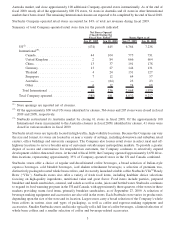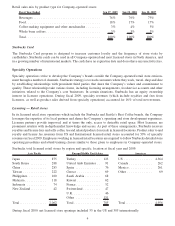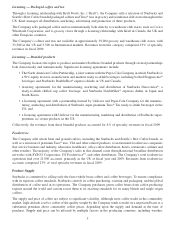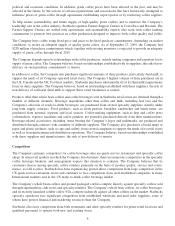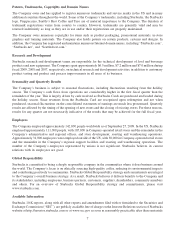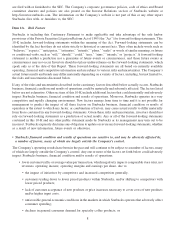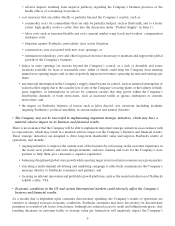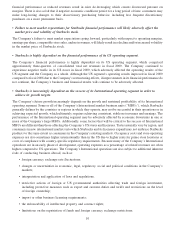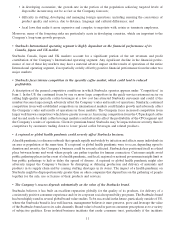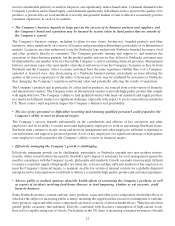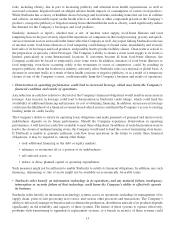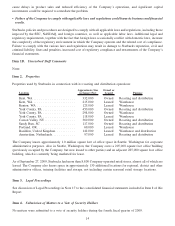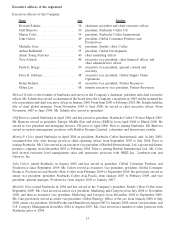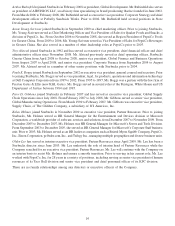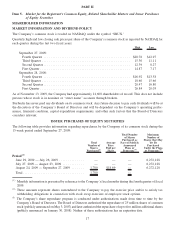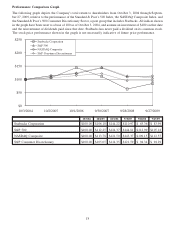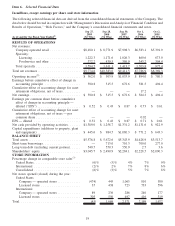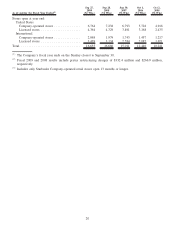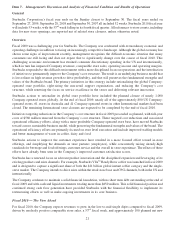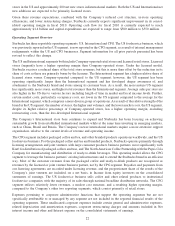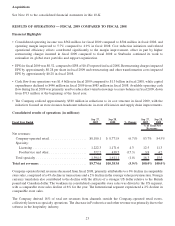Starbucks 2009 Annual Report Download - page 21
Download and view the complete annual report
Please find page 21 of the 2009 Starbucks annual report below. You can navigate through the pages in the report by either clicking on the pages listed below, or by using the keyword search tool below to find specific information within the annual report.risks, including obesity, due in part to increasing publicity and attention from health organizations, as well as
increased consumer litigation based on alleged adverse health impacts of consumption of various food products.
While Starbucks has a variety of healthier choice beverage and food items, including items that are low in caffeine
and calories, an unfavorable report on the health effects of caffeine or other compounds present in the Company’s
products, or negative publicity or litigation arising from other health risks such as obesity, could significantly reduce
the demand for the Company’s beverages and food products.
Similarly, instances or reports, whether true or not, of unclean water supply, food-borne illnesses and food
tampering have in the past severely injured the reputations of companies in the food processing, grocery and quick-
service restaurant sectors and could in the future affect the Company as well. Any report linking Starbucksto the use
of unclean water, food-borne illnesses or food tampering could damage its brand value, immediately and severely
hurt sales of its beverages and food products, and possibly lead to product liability claims. Clean water is critical to
the preparation of specialty coffee beverages. The Company’s ability to ensure a clean water supply to its stores is
limited, particularly in some International locations. If customers become ill from food-borne illnesses, the
Company could also be forced to temporarily close some stores. In addition, instances of food-borne illnesses or
food tampering, even those occurring solely at the restaurants or stores of competitors, could, by resulting in
negative publicity about the foodservice industry, adversely affect Starbucks sales on a regional or global basis. A
decrease in customer traffic as a result of these health concerns or negative publicity, or as a result of a temporary
closure of any of the Company’s stores, could materially harm the Company’s business and results of operations.
•Deterioration in operating performance could lead to increased leverage, which may harm the Company’s
financial condition and results of operations.
Any reduction in cash flow relative to the level of the Company’s financial obligations would result in an increase in
leverage. Any increase in leverage could lead to deterioration in Starbucks credit ratings, which could limit the
availability of additional financing and increase its cost of obtaining financing. In addition, an increase in leverage
could raise the likelihood of a financial covenant breach which in turn could limit the Company’s access to existing
funding under its credit facility.
The Company’s ability to satisfy its operating lease obligations and make payments of principal and interest on its
indebtedness depends on its future performance. Should the Company experience deterioration in operating
performance, it will have less cash flow available to meet these obligations. In addition, if such deterioration were to
lead to the closure of underperforming stores, the Company would need to fund the costs of terminating store leases.
If Starbucks is unable to generate sufficient cash flow from operations in the future to satisfy these financial
obligations, it may be required to, among other things:
• seek additional financing in the debt or equity markets;
• refinance or restructure all or a portion of its indebtedness;
• sell selected assets; or
• reduce or delay planned capital or operating expenditures.
Such measures might not be sufficient to enable Starbucks to satisfy its financial obligations. In addition, any such
financing, refinancing or sale of assets might not be available on economically favorable terms.
•Starbucks relies heavily on information technology in its operations, and any material failure, inadequacy,
interruption or security failure of that technology could harm the Company’s ability to effectively operate
its business.
Starbucks relies heavily on information technology systems across its operations, including for management of its
supply chain, point-of-sale processing in its stores, and various other processes and transactions. The Company’s
ability to effectivelymanage its business and coordinate the production, distribution and sale of its productsdepends
significantly on the reliability and capacity of these systems. The failure of these systems to operate effectively,
problems with transitioning to upgraded or replacement systems, or a breach in security of these systems could
13


